Nouvelles
Representatives of engineering universities from all over the world gather at Polytechnique Montréal for the General Assembly of the T.I.M.E. network and the International Exchange and Internship Fair
From October 16 to 18, 2024, Polytechnique Montréal played host to a major international gathering, as a hundred or so representatives of more than 40 engineering universities and schools in Europe, Asia and South America met to exchange ideas and rethink the internationalization of future engineers’ academic pathways. Following is a summary of the event held on our campus.
The members of the T.I.M.E (Top International Managers in Engineering) network took advantage of lectures, workshops, panel discussions, forums and networking activities to reflect together on the topic “Educating Global Engineers,” while renewing their commitments and optimizing their partnerships.
The T.I.M.E. network holds its General Assembly yearly at a member university, which acts as host for the event. Not only did this mark the first time one of these meetings was held at Polytechnique Montréal, but it was also a premiere for Québec and the rest of Canada, as Polytechnique is still the first and only North American member of the network.
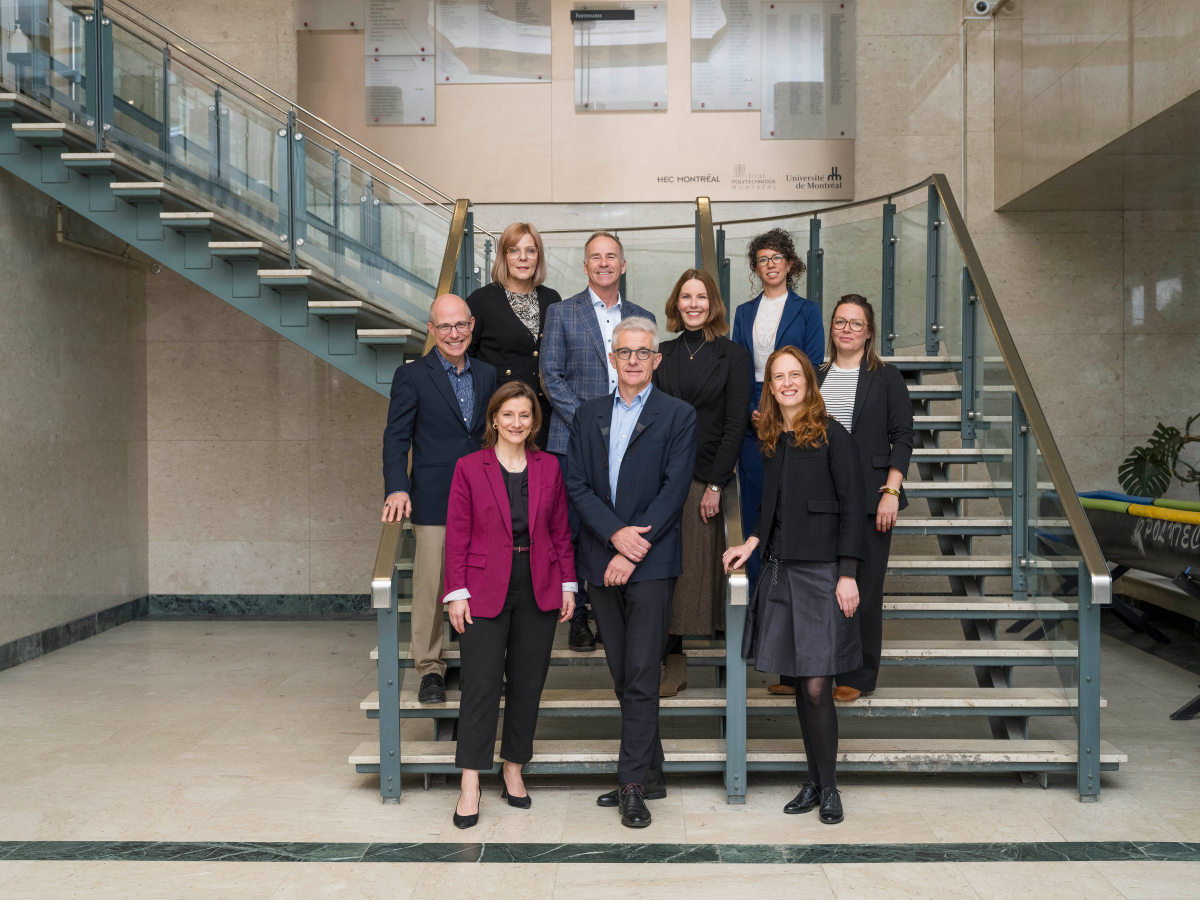
Members of the Polytechnique Montréal International senior executive and the management of the T.I.M.E. network. (Photo: Thierry du Bois)
New voices on the benefits of internationalization
“This was also the first time that this annual event’s program highlighted the voices of students, thanks notably to the panel Perspectives from Engineers of Tomorrow and the presence of representatives of Polytechnique’s student association (the AEP) and graduate student association (AECSP) at several activities, including the forum The Impact of International Mobility on Engineering Students,” explains Julie Defretin, Strategic Advisor – Internationalization (Europe) and T.I.M.E. coordinator with the Polytechnique Montréal international team.
At that forum, Bérénice Dubois, a master’s student in computer and software engineering, Anouar Boumeftah, a graduating student in electrical engineering, and Sébastien Hally, a graduate in industrial engineering (Po 2019) and now an associate with McKinsey & Company in Kenya, shared their points of view and experiences with international mobility. “It’s imperative that we listen to what students and graduates have to say on the subject, because they are a big reason why we develop international partnerships. Our society is evolving, and the needs and realities of our student community are evolving along with it,” Ms. Defretin adds.
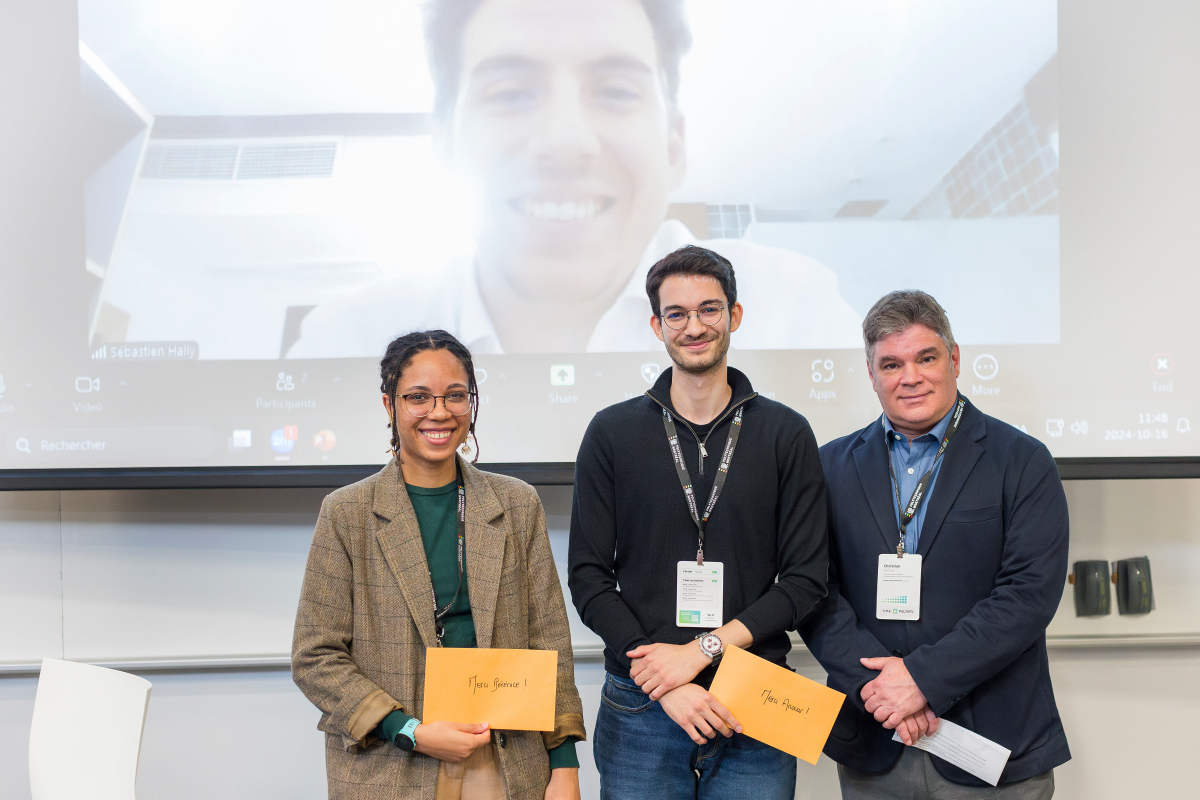
L. to r.: Bérénice Dubois, Sébastien Hally (on the screen) and Anouar Boumeftah with Christian Merciari, Advisor, Communications and Public Relations, Polytechnique Montréal, who moderated the discussion. (Photo: Thierry du Bois)
“Besides student voices, it was very important for us to hear from researchers—in the form of conclusive data on the benefits of internationalization—as well as representatives of the business community,” notes Guylaine Larocque, Strategic Advisor – Internationalization (France and Francophone Belgium), Polytechnique Montréal International. “That truly helps us understand why we engage in internationalization in the first place.”
Exploring that perspective, Olivier Bégin-Caouette, Associate Professor of Comparative Higher Education at the Université de Montréal Faculty of Education, gave the keynote presentation, titled The Internationalization of Higher Education: Lessons from the Past, Paths for the Future.

Professor Olivier Bégin-Caouette. (Photo: Thierry du Bois)
Also meeting network members were representatives of L’Oréal, a partner in the new International Specialization in Industrial & Systems Engineering program (ISIE), which is managed by four T.I.M.E. member institutions and led by Polytechnique Montréal.
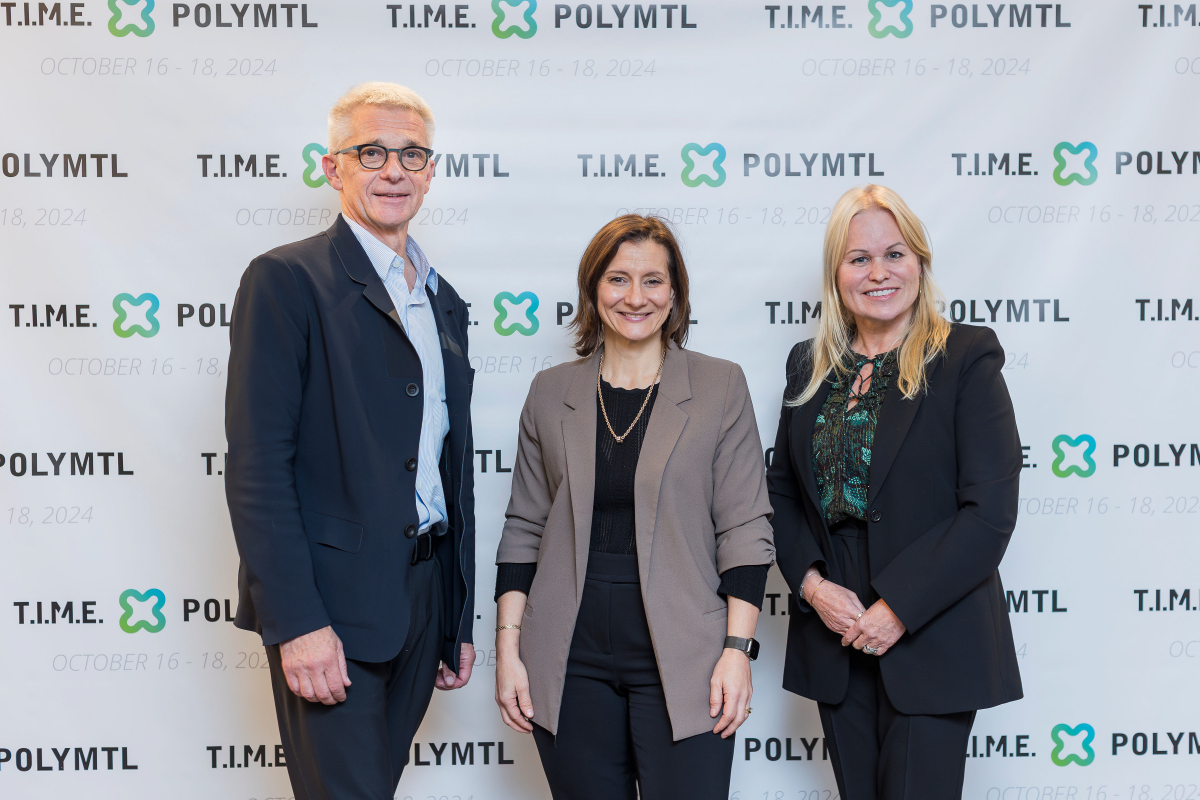
L. to r.: Maud Cohen, President, Polytechnique Montréal; Didier Clouteau, President, T.I.M.E. network; An Verhulst-Santos, President and CEO, L’Oréal Canada. (Photo: Thierry du Bois)
Spotlight on international collaborations
The T.I.M.E. network has connected the world’s leading engineering universities and schools since 1989, focusing on educating engineers. It comprises 56 members from 24 countries, including Australia, Argentina, Brazil, Canada and Japan, along with the main European nations. The network members are renowned for their international collaborations in the areas of research, teaching and industry relations. A key facet of T.I.M.E.’s mission is advancing double-degree programs, as a way of developing globally minded engineers with an international outlook.
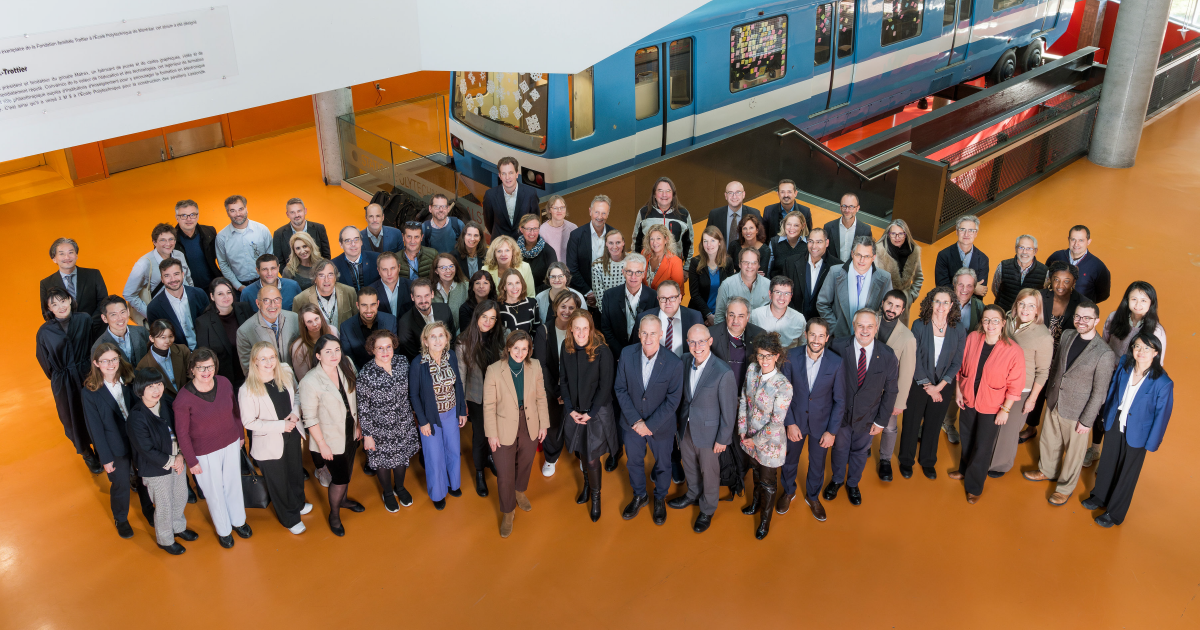
The T.I.M.E. General Assembly attendees at Polytechnique Montréal. (Photo: Thierry du Bois)
Polytechnique Montréal has 190 active collaboration agreements with higher education institutions in 52 countries, including standard one- to two-semester exchange programs as well as strategic partnerships for double-degree programs and specialization years. They include 37 active collaboration agreements among the 56 members of T.I.M.E.
Double-degree pathways in engineering have already been established with more than 15 T.I.M.E. members, among them Centrale Supélec, ENSTA Paris, ISAE SUPAERO, École Nationale des Ponts et Chaussées, Groupe des Écoles Centrales and École des Mines de Saint-Etienne in France, Université Libre de Bruxelles, UCLouvain, Université de Liège and Université de Mons in Belgium, and Politecnico di Milano in Italy. Two new double-degree agreements were signed on the sidelines of the T.I.M.E. gathering at Polytechnique, with Universidad Politécnica de Madrid and Universitat Politècnica de València in Spain.
Internationalization is a core element of Polytechnique Montréal’s vision and mission. One of the four action pillars of its 2024–28 Strategic Plan is to strengthen the university’s social and environmental impact, building momentum to inspire society, for example by maximizing the effectiveness of international partnerships.
Polytechnique’s objectives in organizing this event included enhancing connections, creating more robust relationships and supporting development of international collaborations with T.I.M.E. members, thanks to leadership from professors, students and professionals involved in internationalization of higher education.
Focus on international exchange and internship opportunities
Lastly, on October 21, the second International Exchange and Internship Fair was held in conjunction with the event. For its first edition, in 2023, the Fair had brought together more than 60 international exchange students proudly representing 34 of Polytechnique Montréal’s 190 partner institutions, along with ambassadors from the school’s student community.
There was something new and different for this edition, as interested members of the T.I.M.E. network were able to extend their stay in Montréal to attend it. More than 30 representatives of universities from 14 countries hosted stands and met large numbers of Polytechnique students who took part. Student attendance was estimated to be double that of the previous year, which augurs well for a potential increase in outbound mobility in the coming years.
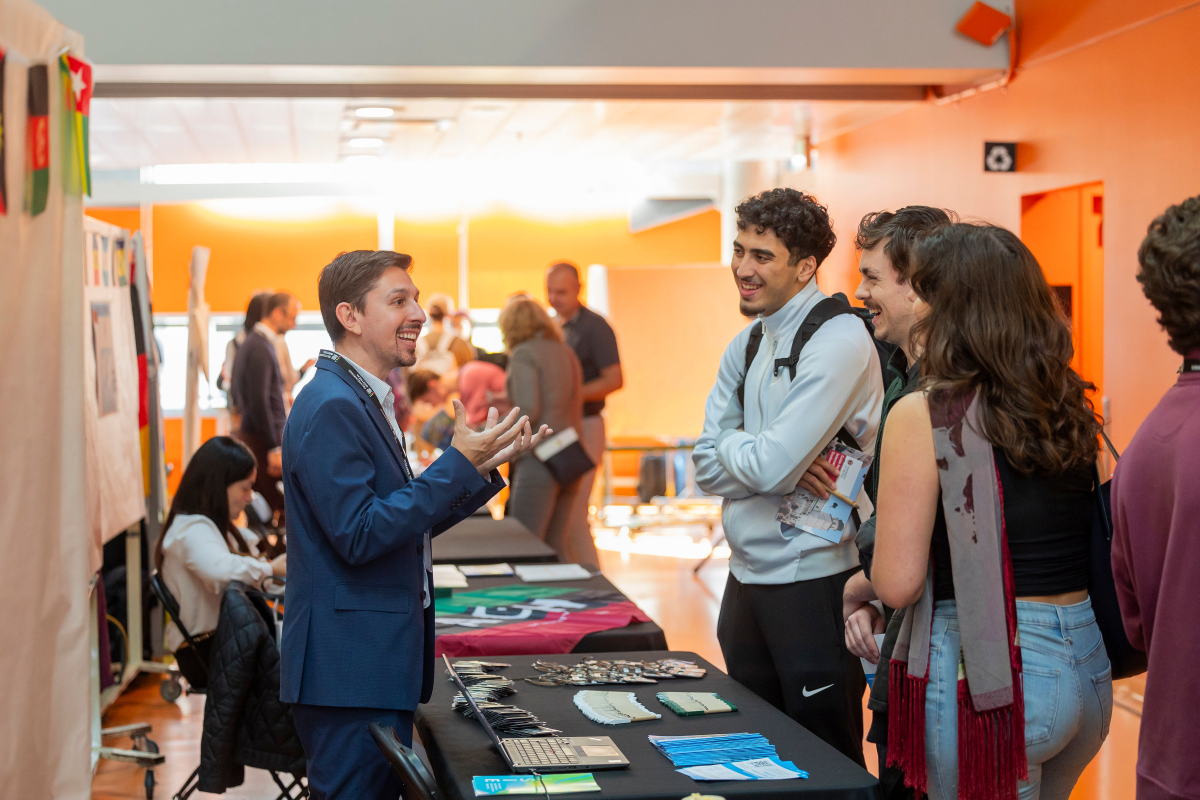
A university representative and Polytechnique students in conversation at the International Exchange and Internship Fair. (Photo: Thierry du Bois)




